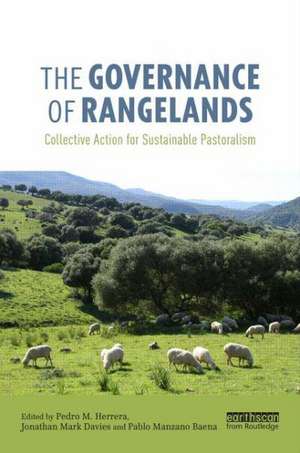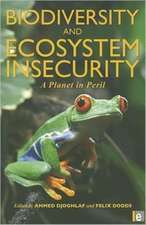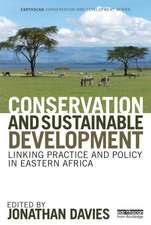The Governance of Rangelands: Collective Action for Sustainable Pastoralism
Editat de Pedro M. Herrera, Jonathan Davies, Pablo Manzano Baenaen Limba Engleză Hardback – 13 oct 2014
This work improves our understanding of the importance of governance, how it can be strengthened and the principles that underpin good governance, in order to prevent degradation of rangelands and ensure their sustainability. It describes the nature of governance at different levels: community governance, state governance, international governance, and the unique features of rangelands that demand collective action (issues of scale, ecological disequilibrium and seasonality).
A series of country case studies is presented, drawn from a wide spectrum of examples from Africa, the Middle East, Central Asia, Europe and North America. These provide contrasting lessons which are summarised to promote improved governance of rangelands and pastoralist livelihoods.
| Toate formatele și edițiile | Preț | Express |
|---|---|---|
| Paperback (1) | 312.43 lei 6-8 săpt. | |
| Taylor & Francis – 12 oct 2017 | 312.43 lei 6-8 săpt. | |
| Hardback (1) | 822.34 lei 6-8 săpt. | |
| Taylor & Francis – 13 oct 2014 | 822.34 lei 6-8 săpt. |
Preț: 822.34 lei
Preț vechi: 1104.21 lei
-26% Nou
Puncte Express: 1234
Preț estimativ în valută:
157.37€ • 163.37$ • 131.22£
157.37€ • 163.37$ • 131.22£
Carte tipărită la comandă
Livrare economică 22 martie-05 aprilie
Preluare comenzi: 021 569.72.76
Specificații
ISBN-13: 9781138785144
ISBN-10: 1138785148
Pagini: 320
Ilustrații: 75 black & white illustrations, 10 black & white tables, 24 black & white halftones, 41 black & white line drawings
Dimensiuni: 156 x 234 x 28 mm
Greutate: 0.59 kg
Ediția:1
Editura: Taylor & Francis
Colecția Routledge
Locul publicării:Oxford, United Kingdom
ISBN-10: 1138785148
Pagini: 320
Ilustrații: 75 black & white illustrations, 10 black & white tables, 24 black & white halftones, 41 black & white line drawings
Dimensiuni: 156 x 234 x 28 mm
Greutate: 0.59 kg
Ediția:1
Editura: Taylor & Francis
Colecția Routledge
Locul publicării:Oxford, United Kingdom
Public țintă
PostgraduateCuprins
Introduction 1. Principles of Pastoralist Governance and Land Management Pedro M. Herrera Calvo, Jonathan Davies and Pablo Manzano Baena 2. Governance of the Rangelands in a Changing World Pedro M. Herrera Calvo, Jonathan Davies and Pablo Manzano Baena 3. Rangeland Resource Governance – Jordan Case Fidaa F. Haddad 4. Ranchers, Land Tenure, and Grass-roots Governance: Maintaining Pastoralist Use of Rangelands in the US in Three Different Settings Lynn Huntsinger, Nathan F. Sayre and Luke Macaulay 5.Community Governance of Natural Resources and Rangelands: the Case of the Eastern Highlands of Morocco Abderrahim Boutaleb and Ilaria Firmian 6. Wetlands in Drylands in the Sahel: the Urgent Need for Good Joint Governance Joost Brouwer 7. Current Situation and Future Perspectives for the Governance of AGRO-pastoral Resources in the Ait Ikis Transhumants of the High Atlas (Morocco) Pablo Dominguez 8. Rangelands Management in Lebanon: Cases from Northern Lebanon and Bekaa Elsa Sattout 9. Legal and Policy Aspects of Rangeland Management: Mongolia Ian Hannam 10. Rangeland Governance in an Open System: Protecting Transhumance Corridors in the Far North Province of Cameroon Mark Moritz, Larissa Bebisse Catherine, Albert K. Drent, Saïdou Kari, Arabi Mouhaman and Paul Scholte 11. Strengthening Communal Governance of Rangeland in Northern Kenya Guyo Roba 12. Searching for Extensive Livestock Governance in the Northwestern Inland of Spain: Achievements from Two Case Studies in Castilla y León Pedro M. Herrera Calvo 13. Strengthening Communal Rangelands Management in Botswana: Legal and Policy Opportunities and Constraints Lael Buckham-Walsh and Cathrine Chipo Mutambirwa 14. Rebuilding Pastoral Governance: Lessons Learned and Conclusions Pedro M. Herrera Calvo, Jonathan Davies and Pablo Manzano Baena References
Notă biografică
Pedro M. Herrera is an environmental consultant and President of the Entretantos Foundation, a Spanish NGO. His professional activity in Spain is shared between the Ancares Leoneses Biosphere Reserve, Gama S.L., a company he co-founded in 2000, and the University of Valladolid Institute of Urbanism.
Jonathan Davies is Director of the Global Drylands Initiative at the International Union for the Conservation of Nature (IUCN), based in Nairobi, Kenya.
Pablo Manzano is a Freelance Consultant and former Global Coordinator for the World Initiative for Sustainable Pastoralism (WISP), based at the IUCN office in Nairobi, Kenya.
Jonathan Davies is Director of the Global Drylands Initiative at the International Union for the Conservation of Nature (IUCN), based in Nairobi, Kenya.
Pablo Manzano is a Freelance Consultant and former Global Coordinator for the World Initiative for Sustainable Pastoralism (WISP), based at the IUCN office in Nairobi, Kenya.
Recenzii
"It is not through universities but through daily practices. It is not through few academic years of study or research but through centuries of love and interaction. It is not through greedy private ownership but through collective rights and stewardship that we, pastoralists, learned how to and did keep the rangelands for "us" and others to enjoy them, feeding our livestock, fighting diseases maintaining our souls and contributing to carbon capturing. It is time that all states and controlling parties recognize and respect pastoralists' collective land rights as a legal and legitimate way of governance so that sustainability of pastoralism is ensured, and pastoralists’ contribution to food security and carbon sequestration is continued. This book is an important contribution showing many experiences of cooperation based on the traditional knowledge and the sense of ownership of the communities to rangelands. The book brings successful stories of rangeland governance where win-win situations are achieved and conflict among different communities has reduced. The variety of success stories should inspire us all to follow the proven success for a more flourishing and peaceful planet!" – Khalid Khawaldeh, Member, World Alliance of Mobile Indigenous Peoples (WAMIP)
"A clear, empirically based, and well-argued manifesto for how to reverse decades of ill-informed policies, and instead recognise and support one of the planet's most sustainable production and land use systems – starting with the critical step of protecting the territorial rights of pastoralists" – Michael Taylor, International Land Coalition Secretariat
"It was in the early nineties and I visited Chad late in the long, dry season. In the Batha Province, north of the provincial capital Ati, I came across lush grasslands where Dorcas Gazelles abounded. There were empty villages with many granaries, all full of millet. An old man that had stayed behind told us that the herdsmen, owners of the granaries and the traditional waterholes, were still in the South, but moving northwards. They would soon be back. Granaries and grass were to feed the herdsmen, their families and livestock before the rains would arrive, new grass would grow and fields with Millet could be harvested again for the next cycle. I realized that I was witnessing some of the last vestiges of pastoral traditions in Africa. Here, traditional management of natural resources survived, respected by all stakeholders. Transhumant and nomadic pastoralists are not always popular with some governments. Their ephemeral stay in places makes them difficult to control, to tax. And yet, as the above example shows, their traditional way of life is based on sound ecological principles. There are lessons to be learned. Lessons that may need to be adapted to the requirements of modern times, but we should make sure not to lose access to this rich source of indigenous knowledge." – Piet Wit, Chair, IUCN Commission on Ecosystem Management
"A clear, empirically based, and well-argued manifesto for how to reverse decades of ill-informed policies, and instead recognise and support one of the planet's most sustainable production and land use systems – starting with the critical step of protecting the territorial rights of pastoralists" – Michael Taylor, International Land Coalition Secretariat
"It was in the early nineties and I visited Chad late in the long, dry season. In the Batha Province, north of the provincial capital Ati, I came across lush grasslands where Dorcas Gazelles abounded. There were empty villages with many granaries, all full of millet. An old man that had stayed behind told us that the herdsmen, owners of the granaries and the traditional waterholes, were still in the South, but moving northwards. They would soon be back. Granaries and grass were to feed the herdsmen, their families and livestock before the rains would arrive, new grass would grow and fields with Millet could be harvested again for the next cycle. I realized that I was witnessing some of the last vestiges of pastoral traditions in Africa. Here, traditional management of natural resources survived, respected by all stakeholders. Transhumant and nomadic pastoralists are not always popular with some governments. Their ephemeral stay in places makes them difficult to control, to tax. And yet, as the above example shows, their traditional way of life is based on sound ecological principles. There are lessons to be learned. Lessons that may need to be adapted to the requirements of modern times, but we should make sure not to lose access to this rich source of indigenous knowledge." – Piet Wit, Chair, IUCN Commission on Ecosystem Management
Descriere
Rangelands are large natural landscapes that can include grasslands, shrublands, savannahs and woodlands. Most pastoralists manage their rangelands communally, benefitting from the greater flexibility and seasonal resource access that common property regimes can offer. This book shows, this creates a major challenge for governance and institutions.











